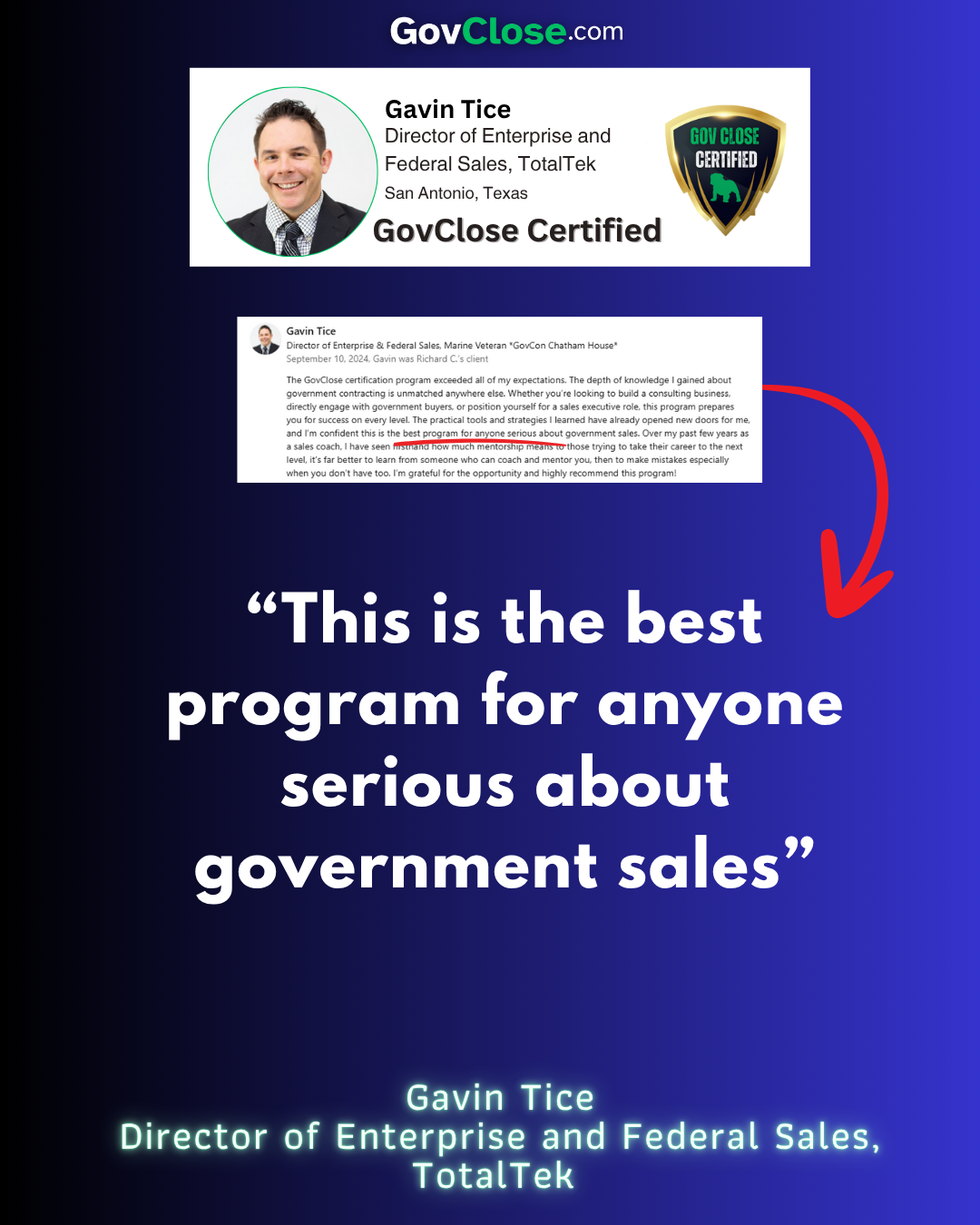Big Changes Ahead: Which SBA Small-Business Certification Will Rule FY26?
Nov 13, 2025If you’ve been following the world of small business government contracting this year, you already know—it’s been a rollercoaster.
The SBA’s small business certification programs—the ones designed to help small businesses compete against large federal contractors—have been under more scrutiny than ever before. And at the center of it all? The 8(a) Business Development Program.
As someone who’s worked in government acquisitions for years and now helps small businesses sell to the government, I can tell you: the landscape has changed dramatically. The 8(a) program is being overhauled after years of abuse, audits, and lawsuits. But not all the news is bad—some programs, like SDVOSB, are stronger than ever.
In this post, I’m breaking down what’s happening inside each major SBA certification—8(a), SDVOSB, WOSB, and HUBZone—what these changes mean for you, and how to actually succeed in this new environment.
Why SBA Certifications Exist (and What They’re Not Meant to Be)
Let’s start with the basics.
The government created set-aside programs to level the playing field—to give small businesses a real chance to compete for federal contracts that would otherwise be dominated by billion-dollar corporations. Programs like 8(a), Service-Disabled Veteran-Owned Small Business (SDVOSB), Woman-Owned Small Business (WOSB), and HUBZone are designed to create opportunities, not shortcuts.
But over the years, a dangerous misconception took hold: that getting certified automatically meant you’d start winning contracts.
That’s not how it works.
Certifications don’t replace the fundamentals of business. You still need:
-
A product or service the government actually buys.
-
Proof you can deliver results.
-
A team that understands how to sell to the government and navigate the procurement cycle.
Without that foundation, even the most powerful certification won’t move the needle.
The 8(a) Program: From Powerhouse to Overhaul
Now let’s talk about the elephant in the room—the 8(a) Business Development Program.
For years, 8(a) was the most powerful certification you could hold. It opened doors to sole-source awards, limited competition, and fast-tracked opportunities for socially and economically disadvantaged businesses. But starting in 2023, things began to unravel.
A federal court ruling struck down the SBA’s use of “presumed disadvantage” based on race, forcing every 8(a) applicant to submit a detailed personal narrative proving their economic or social disadvantage.
That one ruling changed everything.
-
In 2024, over 550 businesses were admitted to the 8(a) program.
-
In 2025, that number dropped to just 66.
Combine that with DOJ bribery investigations and heightened SBA audits, and you’ve got one of the most heavily scrutinized programs in federal contracting history.
But despite the chaos, here’s the truth: 8(a) isn’t going away.
It’s just becoming more selective, more transparent, and more compliant—which, honestly, is a good thing.
If you’re planning to apply or renew, be ready for tighter documentation, deeper background checks, and proof that your business is real, capable, and genuinely disadvantaged.
The SDVOSB Program: Quietly Becoming the Strongest of Them All
While 8(a) has been fighting fires, the Service-Disabled Veteran-Owned Small Business (SDVOSB) program has quietly become the most stable and politically supported certification out there.
Here’s why: it’s merit-based—not tied to race or gender—and that’s made it immune to many of the legal challenges other programs have faced.
In 2023, the SBA took over veteran certifications from the VA, creating a single Veteran Certification Program with stricter verification standards. That transition added legitimacy and reduced fraud.
Now, in 2025, bipartisan legislation is actively strengthening the SDVOSB program—making agencies more accountable for hitting their veteran contracting goals and supporting veteran business succession planning.
If you’re a veteran entrepreneur, this is your time. The VA, DoD, and DHS continue to pour billions into veteran-owned businesses, and contracting officers are under pressure to award those contracts.
The demand is real, the funding is there, and the program has never been stronger.
The WOSB Program: Tougher Rules, Greater Integrity
Next up—the Woman-Owned Small Business (WOSB) program.
Historically, WOSB has faced criticism for being loosely enforced. Too many firms were “woman-owned” on paper only, while men actually ran day-to-day operations.
That’s changed.
As of 2025, SBA rules now require that the woman owner actively works full-time running the business. It’s not enough to hold ownership on paper—she must be managing daily operations, making key decisions, and steering the company.
These updates have tightened verification but also restored credibility to the program.
Yes, it means more documentation and possibly longer application times, but it also means that legitimate women-owned firms will finally have fair access to the opportunities meant for them.
The HUBZone Program: Easier to Qualify, Harder to Fake
The HUBZone program—designed to stimulate economic growth in historically underutilized business zones—has also evolved this year.
The SBA has shortened the employee residency requirement from six months to just 90 days, making it much easier for businesses to meet the 35% rule. That’s a win for many small companies that struggled to maintain long-term residency compliance.
But with that flexibility comes a catch: enforcement is tightening.
Audits are more frequent. The SBA is verifying addresses, cross-checking payroll, and ensuring HUBZone employees actually live and work in qualifying areas.
If you’re in this program, you must stay compliant—because HUBZone violations are one of the fastest ways to lose eligibility or face suspension.
The message is clear: the SBA is making the program more accessible, but not at the expense of integrity.
The Real Threat: Set-Aside Abuse
It’s impossible to talk about certifications without addressing set-aside abuse—and it’s one of the reasons the 8(a) program got hit so hard this year.
Too many companies have tried to game the system—using shell entities, pass-through arrangements, or “front” owners who don’t actually run the business.
These setups violate core SBA rules, especially the “limitations on subcontracting”, which require prime contractors to perform a certain percentage of the work themselves.
When businesses cross that line, they risk:
-
Contract suspension
-
Financial penalties
-
Permanent debarment
If you take away one thing from this section, let it be this: play it straight.
The short-term gain of cutting corners isn’t worth the long-term damage to your reputation—or your business.
Certifications Don’t Build Businesses—People Do
This is where most small business owners get it wrong.
A certification is a tool, not a business model. It can open doors, but what you do after you walk through them determines your success.
You still need:
-
A great product or service
-
Documented performance and references
-
The ability to compete in open-market contracts after your program term ends
Remember—programs like 8(a) are temporary. The goal is to help you grow to the point where you can compete head-to-head with the big players.
That’s why the most successful government contractors I know invest heavily in training, marketing, and relationship building. They understand procurement phases, engage early in the market research stage, and treat contracting officers like long-term clients—not transaction targets.
Training Is the Missing Link
If you’ve ever tried to navigate the world of government contracting, you already know—it’s not intuitive.
Between FAR clauses, SAM.gov, sources sought notices, and endless acronyms, it can feel like a different language. That’s exactly why I started GovClose—to help small businesses and professionals learn how to sell to the government the right way.
You can’t just rely on certifications. You need to understand:
-
How agencies buy
-
Who the real decision-makers are
-
How to build relationships months before solicitations drop
-
And how to position your business to win
That’s the skill set that wins contracts—and it’s completely learnable with the right guidance.
The Bottom Line
Here’s the reality in 2025:
The SBA certification landscape is changing fast.
-
The 8(a) program is under pressure but still alive.
-
The SDVOSB program is thriving.
-
The WOSB program is tougher but more legitimate.
-
And HUBZone is easier to enter but harder to fake.
Across the board, one theme stands out—certifications don’t win contracts; capability does.
If you’re serious about growing your business in the federal space, don’t chase shortcuts. Build value, stay compliant, learn the system, and surround yourself with people who understand how government sales really work.
That’s how you win in this new era of small business contracting.
👉 Learn more about starting your consulting business at GovClose.com
👉Get Weekly Government Contracting Business Tips: https://federalytics.substack.com
👉 Explore the GovClose Certification Program for step-by-step training
👉 Follow me on LinkedIn for free live training and Q&A
Turn Government Contracting Knowledge Into Income
This isn’t a course. It’s a certification and implementation system to help you build a consulting business, land a high-paying sales role, or scale your own company in federal contracting.
We hate SPAM. We will never sell your information, for any reason.


